Information/Write-up
Despite being released 20 years ago, the Canadian hip-hop compilation Rap Essentials Vol. 1's influence and impact is still relevant today. The brainchild of Ivan Berry, known for shepherding the careers of Canadian hip-hop pioneers Michie Mee and the Dream Warriors to stardom through his Beat Factory management company, the Rap Essentials compilation was a critical release that helped to bring exposure to Canada's next generation of hip-hop stars in the '90s. Boasting 12 tracks, the compilation, released on Berry's Beat Factory records, was created to showcase the cream of Canadian hip-hop talent and featured the likes of Kardinal Offishall, Choclair and the Rascalz, exposing many of the featured groups to a national audience for the first time.
It came out at a time after the initial wave of success by Canadian hip-hop artists like Michie Mee, Dream Warriors and Maestro Fresh Wes, all of whom who were initially signed to label deals outside of Canada. Despite the Canadian major label indifference, an independent vinyl scene was flourishing in Canadian cities like Toronto in the mid-to-late '90s. Rap Essentials Vol. 1 arrived in the middle of this output, curating the cream of the crop for wider distribution. For an artist like Kardinal Offishall, who now boasts a global reputation and a long career, Rap Essentials Vol. 1 gave him the opportunity to widen the reach of his very first single, "Naughty Dread," which he had already released on vinyl.
"It says a lot about the impact that it had because definitely that time was very, very, very 12-inch based," says Kardinal. "Everything was all about putting out 12-inches, so it definitely made an impact in Toronto playing on what outlets we had which were pretty much, you know [CKLN] 88.1FM, [CIUT] 89.5FM, [CHRY] 105.5, all of our regular go-to outlets, but Rap Essentials was definitely something I guess that was able to push it to a broader audience that might not have been plugged in to what literally was underground hip-hop at the time."
For Scarborough, Ont. MC Dan-e-o, whose track "Dear Hip-Hop" was arguably the most popular track featured on the compilation, Rap Essentials Vol. 1was a record that had a tangible effect on the Canadian music industry.
"The Canadian hip-hop scene was put on by this album," says Dan-e-o. "The Canadian hip-hop scene had sort of almost a star-studded feel for it at that time. People really dug the album, and really appreciated it as a collection of dope hip-hop songs and it just so happened to be they were all Canadian. So I think it really did a lot to put Canadian hip-hop on the map. This isn't to say that it did that originally, because hip-hop in Canada was already put on the map by the Maestros of the world and the Michie Mees and the Dream Warriors. But this album helped breathe new life into Canadian hip-hop. If anything, it might have been the album that said there's more here than those names I just mentioned. The pioneers got us going, but these guys are the next to do it."
Jonathan Ramos, a music industry veteran who is currently live music manager at INK Entertainment, was the head of marketing for Beat Factory when it released Rap Essentials, a record he feels is 'timeless.'
"If you saw it in terms of a time capsule, you bury this record and dig it up in a time capsule [in the future] or even now and you're like, 'this is a snapshot of Canadian rap at that time," says Ramos. "And it's a really accurate snapshot."
For Ivan Berry, the seed of the compilation germinated from an idea for a label when he was attending a ceremony receiving an urban music award. Berry had invited music executive Denise Donlon (then of MuchMusic and later of SonyBMG ) and Deane Cameron (current president and CEO of Massey Hall and Roy Thomson Hall, then of EMI) to attend the ceremony with him. The two guests were particularly struck by the high level of talent of the R&B and hip-hop performers at the ceremony.
"Denise says to Deane, 'do a label deal with Ivan,'" says Berry. "Well, I had a label deal before with Boombastic Music. We had Split Personality, Rupert Gayle and [comedian Tom Green's rap group] Organized Rhyme. I said, 'Denise, I'm not doing a label deal ever again unless the majors are willing to step up, truly step up. ... A couple of months go by, Dean says, 'I want you to come into my office.'"
After meeting, Berry and Cameron brokered a deal with EMI for a label, extending the Beat Factory brand to the imprint and setting up an infrastructure where Berry got the support to hire staff and the access to marketing and distribution dollars for national campaigns. Then came the dilemma of how to launch artists on the label.
"It occurred to me I could do one of three things," says Berry. "The first thing would be, I take all this money and dump it into one artist and make them a global megastar. That would have major success for the artist. Number two, pick a couple of new artists and develop them properly then they'll have success. That will be major success for them, it'll be major success for me. But at that time I wanted major success for the entire community. So I was like, I can't pick an artist because if I pick an artist it only works for me and them and doesn't work for the scene. So I'm going to do what K-Tel was doing and what [Toronto DJ] Chris Sheppard was doing and do compilation albums. But this time there will be hip-hop and R&B compilation albums and I'm going to dump a shitload of mainstream marketing behind it, where we'll have front page of the top mainstream magazines, radio buys throughout the country, MuchMusic buys. Like, really work it, like we're working a rock project. And at the same time developing a team of executives so that with or without Beat Factory, those executives can go on to mainstream music industry in Canada and we put a little colour and a little flavour and a bit of style in our music industry. At the time it was very whitebread it was very rock, very country."
Obviously, rock and country were not going to figure in the music on the compilation, but Berry got the marketing heft he required for the project. Then there was the unenviable process of picking the songs that would actually be featured. According to Jonathan Ramos, LA Luv, Michie Mee's former DJ who was an A&R for Beat Factory, had a number of tracks under consideration from across the country he wanted to feature and cuts had to be made. "Basically, geographic representation aside, [it was ], 'let's make a list of the 12 favourite tracks' and that's what did it," says Ramos. "[Luv] had stuff from Halifax, he had gone to great pains to make it national."
In the end, the compilation does feature songs by Montreal's Scales Empire and the high profile of Vancouver's Rascalz on potent opening track "FitnRedi," but otherwise only features Toronto artists. "There was like a really thriving scene in Winnipeg at the time, there was stuff happening in Calgary at the time," says Ramos. "You have to ask yourself, "Are we doing this like we have 10 provinces and 2 territories and that's the 12 tracks. Shall we do that or do we just pick the 12 best? And I'm glad we did 'cause I think we weren't trying to win a popularity contest. We were trying to sell records."
The lack of women on the compilation is also something that is noticeable, though Motion, Michie Mee and Tara Chase are featured on the 1998 Rap Essentials 2 follow-up release.
"To be selected to be what was considered to be the cream of the crop by Ivan at that time, it also just changed the way people thought about you," says Kardinal. " I think for my career it was also legitimizing the fact that I had my own music that could go to the forefront as well, so I think it definitely helped me in terms of people like, 'oh cool, I've seen him with Saukrates, I've seen him with Choclair, I've seen him with a bunch of different people,' but people got to see me in my own light and that was literally the first time people got to see me in a big way in a solo way."
The compilation featured many Toronto acts who were already generating a buzz around the country and south of the border. Ghetto Concept, who were key influencers of Toronto's independent vinyl scene, had a track entitled "U.L." on the album while production team Down to Erf featured Mathematik (who would later release his critically acclaimed album Ecology on Beat Factory) on the song "Learn to Earn" and also produced Citizen Kane's knowledge-dispensing "Structure Foundation." Other notable contributions came from artists like Red Life and Black-I, a late, former backup dancer for Maestro Fresh Wes. "It was literally a platform right that elevated an existing scene," says Ramos. "That's really what [Rap Essentials] did. It took the thing from a community in terms of DJs and people in the music industry in Toronto who knew a lot of these acts, some of them they didn't know and it elevated it."
Consequently, tracks like Choclair's vulnerable, yet steely-eyed yarn of disillusionment, "Twenty One Years," and Kardinal's "Naughty Dread" — which infectiously crystallized his now inimitably syncretic blend of reggae and hip-hop — gained wider audiences.
"Just when you play that song, it's so nostalgic for people," says Kardinal. "I don't often perform it, so it's interesting when that music kicks in. It just signifies a lot for people and for me really just the birth of my whole rudeboy movement, you know what I'm saying? 'Cause yeah, I think that's when I figured out that it could be possible and when I got a little formula that worked."
Dan-e-o's "Dear Hip Hop" appeared on the compilation along with his fellow Monolith crew member Wio-K's song "Sunlight," and although "Dear Hip Hop" had not been previously released, it gained popularity through its video gaining heavy rotation on MuchMusic, as well as its open-hearted honesty.
"'The "Look of Love" sample, the Ramsey Lewis sample, it had love song written all over it," says Dan-e-o. "At 17 years old, I hadn't really been in love to talk about a girl the way I could talk about relationships now. It wasn't there yet as a 17 year old. So I thought this is a love song. What do I love? Who do I love?' It was hip-hop."
Toronto producer Scam's beat was actually Dan-e-o's second choice. His first choice beat had already been claimed and was used on another Rap Essentials Vol. 1 track, "Boiling Point" by Concrete Mob (recently lauded on CBC's q by Toronto spoken word artist Ian Kamau). Two years after he wrote the song in 1994, Dan-e-o got to see how the song resonated while on the nationwide Rap Essentials tour.
"I remember pretty clearly the show in Victoria, B.C.," he says. "One, I remember, this is the furthest distance from Toronto possible in this country. It was towards the end of the first leg of the nationwide tour. We did a bunch of dates after that going into '97. But that was the final set of dates going west. And I remember because [the audience] had time to learn it. Almost everybody was lip-syncing along and rapping along to the lyrics of "Dear Hip-Hop," so for a 19-year-old who was having his first taste of the tour life, .... to have people across the country rap my song, memorize my lyrics, it was unbelievable. I was really on top of the world at that moment."
For wizened industry veteran Ivan Berry, however, the knowledge of the existence of die-hard hip-hop fans in every part of the country was already something he was well aware of.
"I toured Canada with Michie Mee and the Dream Warriors so many times and I knew that hip-hop heads were everywhere," says Berry. "Not just the major cities, but small towns. I personally knew that and that's why I knew [Rap Essentials] would work. They just didn't have access to gaining and seeing the music in the mainstream and to purchasing the music at the HMVs, etc. Back then, we knew Vancouver had a scene, Calgary, Edmonton, Montreal, Ottawa and Toronto had a scene. [My Beat Factory team] didn't know Kingston was going to do 1,000 people or London or Windsor or Kamloops or Saskatoon, Banff. Nobody would equate there's a snowboard and BMX biker community in Banff and at the ski resorts, so when we rolled up in there, there's a 1,000 kids coming to see a Rap Essentials tour. It was surprising for people who haven't travelled the country in that context."
Despite the successes on the tour, the album's sales, while respectable, didn't make it go gold or platinum. On top of that, Berry's significant investment into its release didn't garner commercial radio airplay. The songs associated with the compilation were largely relegated to MuchMusic and university and college radio. "There were two struggles we were facing. You talk to marketing people at major labels who are marketing rap records at the time, it was a struggle," says Ramos. "I'm talking about American rap records in Canada. Now you compound that with the fact that we're talking about Canadians who are quintessentially doing an American art form and you've got to double the weight."
Berry says that ultimately sales were not going to be the only metric the project was judged on, because at the beginning, the larger goal was to cultivate the hip-hop scene in Canada.
"I don't want to say it was a failure, because it certainly wasn't, but with the level of spend we needed to make the impact we needed to make a couple of things. We couldn't continue spending that sort of money with the mainstream sales," said Berry. "It's not like Rap Essentials went gold or platinum ... but the impact was like, diamond."
Despite the release of more Rap Essentials material and the Groove Essentials series, among other projects, the label eventually ceased operations as the 2000s hit. Berry attributes the waning appeal of the compilations and the encroachment of digital music as some of the reasons, but he still believes Rap Essentials was an important chapter in the Canadian hip-hop continuum.
"I think in the '80s we had Michie Mee doing her thing and that really created a groundswell for all the artists in the early 90s, the Kardinals, the Choclairs and the Rascalz, the Dan-e-o's, Ghetto Concept and all that stuff," says Berry. "But I think the compilation albums, with the marketing we threw at it, was one of the focal points that created or broke down calling Canadian hip-hop underground. Because out of that, Rascalz came out and had a gold record [Cash Crop]. Choclair came out and had a gold record [Ice Cold]. Whatever their sales were, their sales were extremely mainstream and then with their smart business managers they went on to have extremely successful careers. And up to today, Kardinal is still putting out records."
From Dan-e-o's point of view, the album is still extremely relevant and his social media posts have been highlighting the 20th anniversary of the Rap Essentials Vol. 1 release in November. He's currently working on songs that will feature participants from the compilation on his new project he hopes to release in the new year, having contacted several artists already. "I definitely wanted to have representation of the Rap Essentials Vol. 1 album," says Dan-e-o. "Recognizing that it's not just Dear Hip Hop's 20th anniversary, it's that album's 20th anniversary."
-Del Cowie, CBC
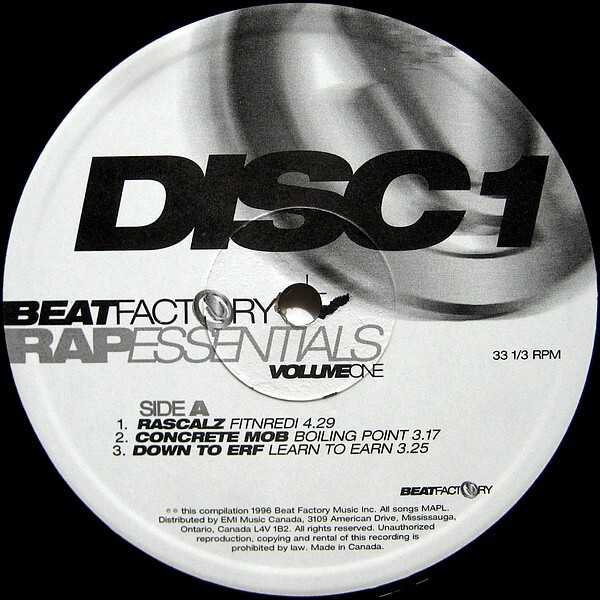
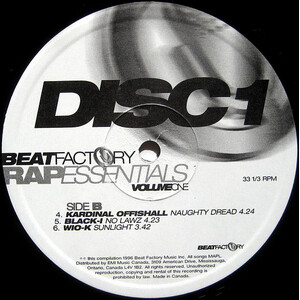
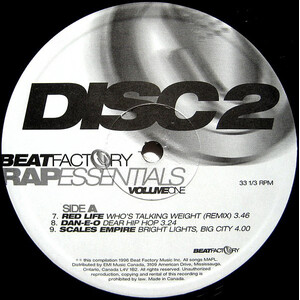
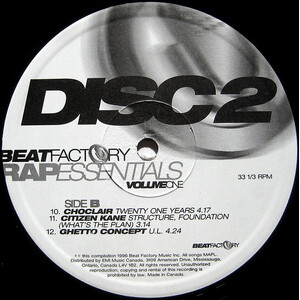
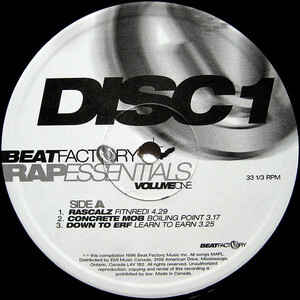
No Comments